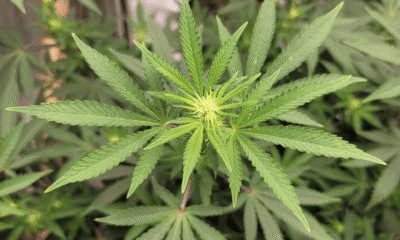featured
The Living Soil Revolution: Cannabis, Regeneration, and Resistance
Published
11 hours agoon

For all the talk about potency, yield, and branding, the real revolution in cannabis is happening underground—in the living soil. Dig your hands into it and you’ll feel it breathing: earthworms tunneling, mycelium threading through humus, microbes trading nutrients like a microscopic marketplace. This is where the plant’s magic begins.
“Living soil” isn’t a buzzword; it’s a rebellion. As the legal industry chases sterile perfection through hydroponics and chemical control, a growing movement of cultivators is going back to the dirt—not out of nostalgia, but necessity. In their eyes, saving the plant means saving the planet.
What Is Living Soil?
At its simplest, living soil is exactly what it sounds like: soil that’s alive. It’s a self-sustaining ecosystem rich with fungi, bacteria, protozoa, nematodes, and organic matter, all cycling nutrients to the plant in exchange for root exudates (the sugars the plant feeds them).
Dr. Elaine Ingham, a pioneering soil microbiologist and founder of the Soil Food Web School, describes healthy soil as operating like a “nutrient banking system” —microbes store and release elements as the plant demands. Her Soil Food Web approach is used by growers who want to restore soil biology rather than override it.
In cannabis cultivation, that relationship is everything. When soil is thriving, plants develop deeper terpene profiles, stronger immune systems, and richer cannabinoid expressions. Living soil doesn’t just grow cannabis. It grows the complexity that makes cannabis cannabis.
The Cannabis Soil Rebellion
The industrialization of legal cannabis has come with a price: uniformity. Across North America, massive hydroponic facilities dominate headlines with LED wattage, square footage, and quarterly yields. Yet for all their gleaming technology, something essential gets lost—the character of the plant.
In contrast, small-scale legacy growers from Northern California’s Emerald Triangle to forests of Maine and Oregon are leading what they call the “soil rebellion.” These cultivators aren’t anti-progress; they’re anti-sterility. Their farms hum with compost-tea brewers instead of air conditioners. Their grow rooms smell of earth, not disinfectant.
To them, living soil is a statement of resistance—a middle finger to the corporate model that treats cannabis like a commodity instead of a culture. They’re not chasing uniformity; they’re chasing vitality.
The Environmental Stakes
Industrial cannabis is quietly becoming one of the most energy-hungry crops in North America. A major study in Nature Sustainability found that indoor cannabis cultivation can generate between 2,283 and 5,184 kilograms of CO₂-equivalent per kilogram of dried flower, largely driven by lighting, HVAC, and environmental control systems.
In some reporting, that’s framed as equivalent to growing one ounce of cannabis indoors having the same emissions as burning 7–16 gallons of gasoline, depending on location.
By contrast, sun-grown and living-soil operations drastically reduce that footprint. No artificial lighting. No chemical runoff. No wasted nutrients. Instead, cultivators build closed-loop systems: composting leftover plant material, capturing rainwater, and encouraging biodiversity that manages pests naturally.
As the planet warms, the cannabis industry faces a choice. Either double down on energy-intensive “clean rooms,” or return to the soil systems that sustained the plant for millennia. The growers choosing the latter aren’t Luddites; they’re the real innovators.
Microbes, Mycelium, and Medicine
Living soil isn’t just an environmental win—it’s an alchemical one. Beneath the surface, a web of mycorrhizal fungi extends far beyond the roots, exchanging minerals for sugars and transmitting chemical signals between plants. It’s the internet of the earth, and cannabis thrives in that connectivity.
Terpenes, the aromatic compounds that define each strain’s scent and therapeutic profile, are heavily influenced by soil biology. Plants grown in biologically active soils often show higher terpene diversity and potency than those grown in sterile hydro systems. (See studies in Frontiers in Plant Science and other journals correlating soil microbial diversity with improved secondary metabolites.)
The rhizosphere—the narrow soil layer immediately surrounding the roots—is where most of that chemical exchange happens. Roots exude sugars and organic acids that feed microbes, which in turn break down nutrients and make them available to the plant.
In short, the microbes matter. When cultivators nurture the unseen world underfoot, they’re amplifying not just yield but medicine, but producing flower that’s chemically richer, more aromatic, and more effective for the end user.
Farmers as the New Counterculture
It’s tempting to view the living-soil movement as a trend, but talk to the people building compost piles at midnight or experimenting with Korean natural farming techniques, and you’ll hear a different tone: one of defiance.
These are farmers who see themselves as stewards, not suppliers. They reject synthetic control because it mirrors the same top-down systems that outlawed cannabis in the first place. Living soil, to them, is a political act. An assertion of autonomy and connection in an industry increasingly run by spreadsheets.
This isn’t hippie nostalgia. It’s a science-backed rebellion with cultural roots stretching to the earliest cannabis communities. The living-soil movement echoes the same anti-establishment ethos that made cannabis a symbol of resistance in the 1960s and ’70s. Only now, the battleground isn’t in the streets—it’s beneath our feet.
The Return to the Roots
Every few years, the cannabis industry reinvents its buzzwords: “craft,” “premium,” “sustainable.” But the growers working in living soil aren’t selling trends; they’re rebuilding relationships. To them, soil is sacred. It’s the link between plant, person, and planet. It’s a partnership that industrial models can’t replicate.
And maybe that’s the real message of living soil. Beneath the debates over legalization, taxes, and potency lies a simple truth: what we grow reflects how we live. If we cultivate sterile, extractive systems, we’ll get sterile, extractive results. But when we nurture life—in the soil, in our communities, in our politics—we harvest something far more powerful.
The next revolution in cannabis isn’t coming from boardrooms or branding agencies. It’s already happening in the ground—quiet, humble, unstoppable.

Author: mscannabiz.com
MScannaBIZ for all you Mississippi Cannabis News and Information.
You may like
-


MariMed Announces Strategic Exit From Missouri Cannabis Market
-


Tribe In Nebraska Approves First Marijuana License As State Officials Scale Back Voter-Approved Medical Cannabis Law
-


Why California’s Treasurer Says the State’s Adult-Use Cannabis Law Is a Failure
-


New Hampshire House Lawmakers Approve Marijuana Legalization Bill
-


Marijuana Has Way Taken Over Cigarettes
-


Anarchy in the UK: Ketamine Deaths Increase 10 Fold in 10 Years
featured
MariMed Announces Strategic Exit From Missouri Cannabis Market
Published
10 minutes agoon
October 28, 2025
[PRESS RELEASE] – NORWOOD, Mass., Oct. 28, 2025 – MariMed Inc., a leading cannabis consumer packaged goods company and retailer, announced that it has completed a strategic review of its Missouri business operations and decided to exit the market, effective immediately.
Since 2024, the Company has managed the Missouri operations of another licensed cannabis operator and distributed certain of its brands there under a Managed Services and Licensing Agreement, while awaiting license transfer approval from the state. The company will no longer manage the facility and will no longer seek the license transfer.
MariMed continues to own or manage revenue-generating operations in six states, including 13 dispensaries and six cultivation and processing facilities in Delaware, Illinois, Maryland, Massachusetts, Ohio and Pennsylvania. Exiting Missouri is expected to improve the company’s overall financial performance, particularly gross margin and adjusted EBITDA, and allow management to focus resources on higher return opportunities.
“Our brands performed well in the select stores where they were available in Missouri, but we concluded that reaching scale would have required significant resources we believe are better utilized in our core markets, where MariMed has established strong retail and wholesale positions,” MariMed CEO Jon Levine said. “Moving forward, we will consider licensing opportunities in Missouri with a vertical operator if it makes financial sense and supports our goal of becoming a cannabis CPG powerhouse.”

Author: mscannabiz.com
MScannaBIZ for all you Mississippi Cannabis News and Information.
featured
Tribe In Nebraska Approves First Marijuana License As State Officials Scale Back Voter-Approved Medical Cannabis Law
Published
1 hour agoon
October 28, 2025
As Nebraska officials face criticism over attempts to significantly scale back a voter-approved medical marijuana law, an Native American tribe within the state has now approved its first license for a vertically integrated cannabis operation since approving legalization in its borders earlier this year.
At its first meeting on Monday, the Omaha Tribe of Nebraska’s Cannabis Regulatory Commission discussed proposed rules to stand up the tribal marijuana market. They also agreed to license the tribe itself to move forward with next steps in setting up the industry for launch.
The draft rules weren’t adopted at the meeting, but the tribe’s attorney general, John Cartier, said that in time he wants the territory to “stand as a direct contrast to that dysfunction and show that the will of the voters is being respected, at least on the Omaha Reservation.”
“We’re prepared to move forward to grant access to the folks that need help through medical cannabis,” he said.
Under the legalization code that the tribe adopted in July—making it the first to enact such a reform in a state where lawmakers have long resisted the policy change—adults 21 and older can purchase and possess up to an ounce of cannabis as long as they’re on the tribal land.
Arthur Isagholian, a member of the cannabis commission, cautioned at the meeting that, “If you violate rules off of the tribal land and you get caught with product that you purchased on tribal land, you’re kind of on your own,” as NTV reported.
While the tribe approved a vertically integrated license for its own purposes to help streamline the implementation of legalization in the territory, it’s unclear when the regulatory rules will go up for a vote and open up opportunities for legal sales.
The tribe’s license “will be subject, obviously, to our published rules and regulations—but just so the tribe is able to start working towards agreements, equity and funding while we’re hashing this out,” a member said.
The commission will be meeting once a month, and it’s expected that at least some of the proposed regulations will be approved when members come together again in November.
In a press release ahead of Monday’s meeting, the tribe’s attorney general had some choice words for state officials.
“While Nebraska’s process lurches from delay to debate, we’re doing the one thing patients and businesses need—governing,” Cartier said. “On October 27, we give Nebraska a greenlight: clear rules, real oversight, and a workable, well-regulated industry rooted in sovereignty, safety, and common sense.”
“We want to stand as a direct contrast to that dysfunction [at the state level] and show that the will of the voters is being respected, at least on the Omaha Reservation, and we’re prepared to move forward to grant access to the folks that need help through medical cannabis,” he said.
He’s not alone is the criticism. Advocates have strongly pushed back against the state after a governor-appointed panel put forward proposed rules for the medical cannabis market, including prohibitive purchasing limits.
—
Marijuana Moment is tracking hundreds of cannabis, psychedelics and drug policy bills in state legislatures and Congress this year. Patreon supporters pledging at least $25/month get access to our interactive maps, charts and hearing calendar so they don’t miss any developments.![]()
Learn more about our marijuana bill tracker and become a supporter on Patreon to get access.
—
While the state approved its first medical cannabis business license to a cultivator, there is still no lawful means for patients to access products yet.
Meanwhile, last month Nebraska activists have filed an initiative to legalize marijuana and establish a constitutional right to use cannabis for adult over the age of 21. If organizers collect enough valid signatures from registered voters, it could appear on the 2026 ballot.
The marijuana reform push also comes as the state attorney general is cracking down on sales of intoxicating hemp-derived products, including those containing delta-8 THC.
Las year’s approval of two medical marijuana ballot measures came after an earlier attempt in 2020 gathered enough signatures for ballot placement, but saw the measure invalidated by the state Supreme Court following a single-subject challenge. Supporters then came up short on signatures for revised petitions in 2022 due in large part to the loss of funding after one of their key donors died in a plane crash.
Photo courtesy of California State Fair.

Author: mscannabiz.com
MScannaBIZ for all you Mississippi Cannabis News and Information.
featured
Why California’s Treasurer Says the State’s Adult-Use Cannabis Law Is a Failure
Published
2 hours agoon
October 28, 2025
“We shouldn’t be harassing people who are trying to do the right thing and paying their taxes.”
At IgniteIt’s Market Spotlight: California, Treasurer Fiona Ma told a packed room what many licensees have been saying for years — then laid out where the fixes need to happen.
Why the treasurer matters here
A treasurer is basically the state’s banker. All revenues flow through Ma’s office; roughly $3 trillion a year by her tally. She invests a portfolio in the $150 to $250 billion range, balances it daily to six decimals, and issues California’s bonds for infrastructure and the UC and CSU systems. When finance policy closes doors, she sees it first. When a legal industry cannot access programs or capital, she sees the gap. As she reminded the crowd, the governor is not her boss. Voters are.
During COVID, California pushed out about $28 billion in state grants. “Not one penny could go to cannabis because it’s still Schedule I [substance].” That single constraint still shapes how the industry banks, borrows, and plans.
What she told operators, straight up
Enforcement is upside down. Ma described agencies targeting licensees they can find (because they can find them) while obvious illicit activity lingers for months. She called for coordination and a focus on actors who refuse to play by the rules. She added that during COVID, many state workers were not on site, and even now average about two days a week, which weakened enforcement.
Also read: Every Two Minutes, Someone in America Is Arrested for Marijuana
Tracking is clunky and duplicative. Operators maintain internal systems, then layer METRC on top. The result is redundancy, cost, and confusion.
Leakage is real, tax capture is not. California still produces at scale. Newer markets are thriving without matching in-state production. The product is coming from somewhere, and too much of it bypasses legal channels and taxes. On how Prop 64 has played out, Ma was blunt: “Ten years later, it is a failure.”
Reliable state programs are thin. Asked what cannabis can actually count on at the state level, her first answer was stark: “Nothing. … Not much.” She noted that only one state loan program is currently accessible to cannabis businesses. An audience member flagged OCAL under CDFA as a bright spot, and Ma welcomed highlighting anything that works.
Banking remains a choke point. Ma backed financial institutions that chose to serve cannabis and said many charge high due diligence fees. Support helps, but cost and coverage remain uneven.
Budget context is real. California faces a structural deficit of about $20 billion a year. Ma’s argument is fiscal as much as philosophical: fix the legal market, grow the taxable pie, stop pretending the illicit delta is invisible.
The federal piece
On the path forward, Ma did not mince words: “It should be descheduled completely.” Her concern is practical. Push cannabis toward a pharmacy counter with ID checks and prescription-style rules and access gets clunky while the illicit market keeps its edge. True descheduling would unlock normal banking, modernize compliance, and let regulators focus on safety and bad actors rather than paperwork hunts.
A regulator who speaks like a human
Ma’s relationship to the plant is not theoretical. She mentioned using gummies to manage sleep through a tough stretch. It landed because it was simple, relatable, and said without posture.
Politics in the room
On stage, Ma was introduced with an enthusiastic nod toward a run for lieutenant governor. She urged the industry to talk to every candidate in the next governor’s race and find out who actually understands the issues. The response from operators and investors was loud.
What to do now if you are plant-touching
- Make your books bulletproof. Treat audits, KYC, and traceability as daily hygiene. If you run parallel tracking, make sure the data matches every time.
- Push for rational enforcement. Support efforts that prioritize illicit-market reduction over low-hanging paperwork targets.
- Engage early. These races will shape enforcement priorities, banking access, and tax design. Know who gets it.
About the event, and what’s next
These remarks were delivered at IgniteIt Presents: Market Spotlight, California. The series moves to the Midwest next.
If California is the stress test, Ohio is the next checkpoint. The questions Ma raised in California are the same ones Ohio will have to answer. Operators who prepare now will be the ones left standing when the noise settles.
Photo: Shutterstock

Author: mscannabiz.com
MScannaBIZ for all you Mississippi Cannabis News and Information.

MariMed Announces Strategic Exit From Missouri Cannabis Market

Tribe In Nebraska Approves First Marijuana License As State Officials Scale Back Voter-Approved Medical Cannabis Law

Why California’s Treasurer Says the State’s Adult-Use Cannabis Law Is a Failure

New Hampshire House Lawmakers Approve Marijuana Legalization Bill

Marijuana Has Way Taken Over Cigarettes

Anarchy in the UK: Ketamine Deaths Increase 10 Fold in 10 Years

Opportunity To Take Down a Major Plank of Marijuana Prohibition

Three In Five Kansans Back Legalizing Recreational Marijuana—And 70% Want Medical Cannabis—New Poll Finds

The Perfect Cup Of Cannabis Tea

Access To Legal Marijuana Shops Is Linked To Reduced Heavy Alcohol Drinking, Federally Funded Study Finds

Trump pushed to legalize cannabis by Colombian president (Newsletter: October 28, 2025)

The Living Soil Revolution: Cannabis, Regeneration, and Resistance

Colombia’s President Tells Trump To Legalize Marijuana To Combat Illicit Drug Trade

39 Bipartisan State And Territory Attorneys General Push Congress To Ban Intoxicating Hemp Products
New Jersey Democratic Gubernatorial Candidate Previews Marijuana Policy Priorities If Voters Elect Her Next Week

What If Barstool and Vice Hotboxed a Studio? Proper Smoke Network by First Smoke x Proper Doinks Has Arrived

Ohio Lawmakers Approve Marijuana Bill That Creates A Process To Expunge Past Convictions

How Cannabis Can Help Combat Fall Respiratory Ailments

The Boston Beer Co. Launches Emerald Hour Gummies in Canada

The High Times Guide to THCA: What It Is, How It Works, and Why Everyone’s Talking About It

The best grow tents of 2025

Kansas Lawmakers Discuss Legality Of Intoxicating Hemp THC Products

Guess What Is Threading Its Way Back To Being Popular

39 Attorneys General Tell Federal Lawmakers to Ban Hemp THC Products

Alert: Department of Cannabis Control updates data dashboards with full data for 2023

Connecticut Appoints The US’s First Cannabis Ombudsperson – Yes there is a pun in there and I’m Sure Erin Kirk Is Going To Hear It More Than Once!

5 best CBD creams of 2024 by Leafly

Recreational cannabis on ballot for third time in South Dakota

EU initiative begins bid to open access to psychedelic therapies
New Study Analyzes the Effects of THCV, CBD on Weight Loss

Free delta-9 gummies from Bay Smokes

5 best autoflower seed banks of 2024 by Leafly

Discover New York’s dankest cannabis brands [September 2024]

May 2024 Leafly HighLight: Pink Runtz strain

Press Release: CANNRA Calls for Farm Bill to Clarify Existing State Authority to Regulate Hemp Products

5 best THC drinks of 2024 by Leafly

Local medical cannabis dispensary reacts to MSDH pulling Rapid Analytics License – WLBT

6 best CBD gummies of 2024 by Leafly

Curaleaf Start Process Of Getting Their Claws Into The UK’s National Health System – With Former MP (Resigned Today 30/5/24) As The Front Man

5 best delta-9 THC gummies of 2024 by Leafly

Horn Lake denies cannabis dispensary request to allow sale of drug paraphernalia and Sunday sales | News

The Daily Hit: October 2, 2024

Mississippi city official pleads guilty to selling fake CBD products

Nevada CCB to Accept Applications for Cannabis Establishments in White Pine County – “Only one cultivation and one production license will be awarded in White Pine County”

5 best THCA flower of 2024 by Leafly

Weekly Update: Monday, May 13, 2024 including, New Guide for Renewals & May Board meeting application deadline

6 best hemp pre-rolls of 2024 by Leafly

PRESS RELEASE : Justice Department Submits Proposed Regulation to Reschedule Marijuana
Trending
-

 California Cannabis Updates1 year ago
California Cannabis Updates1 year agoAlert: Department of Cannabis Control updates data dashboards with full data for 2023
-

 Breaking News1 year ago
Breaking News1 year agoConnecticut Appoints The US’s First Cannabis Ombudsperson – Yes there is a pun in there and I’m Sure Erin Kirk Is Going To Hear It More Than Once!
-

 best list1 year ago
best list1 year ago5 best CBD creams of 2024 by Leafly
-

 Business1 year ago
Business1 year agoRecreational cannabis on ballot for third time in South Dakota
-

 Business1 year ago
Business1 year agoEU initiative begins bid to open access to psychedelic therapies
-

 cbd1 year ago
cbd1 year agoNew Study Analyzes the Effects of THCV, CBD on Weight Loss
-

 Bay Smokes1 year ago
Bay Smokes1 year agoFree delta-9 gummies from Bay Smokes
-

 autoflower seeds1 year ago
autoflower seeds1 year ago5 best autoflower seed banks of 2024 by Leafly


